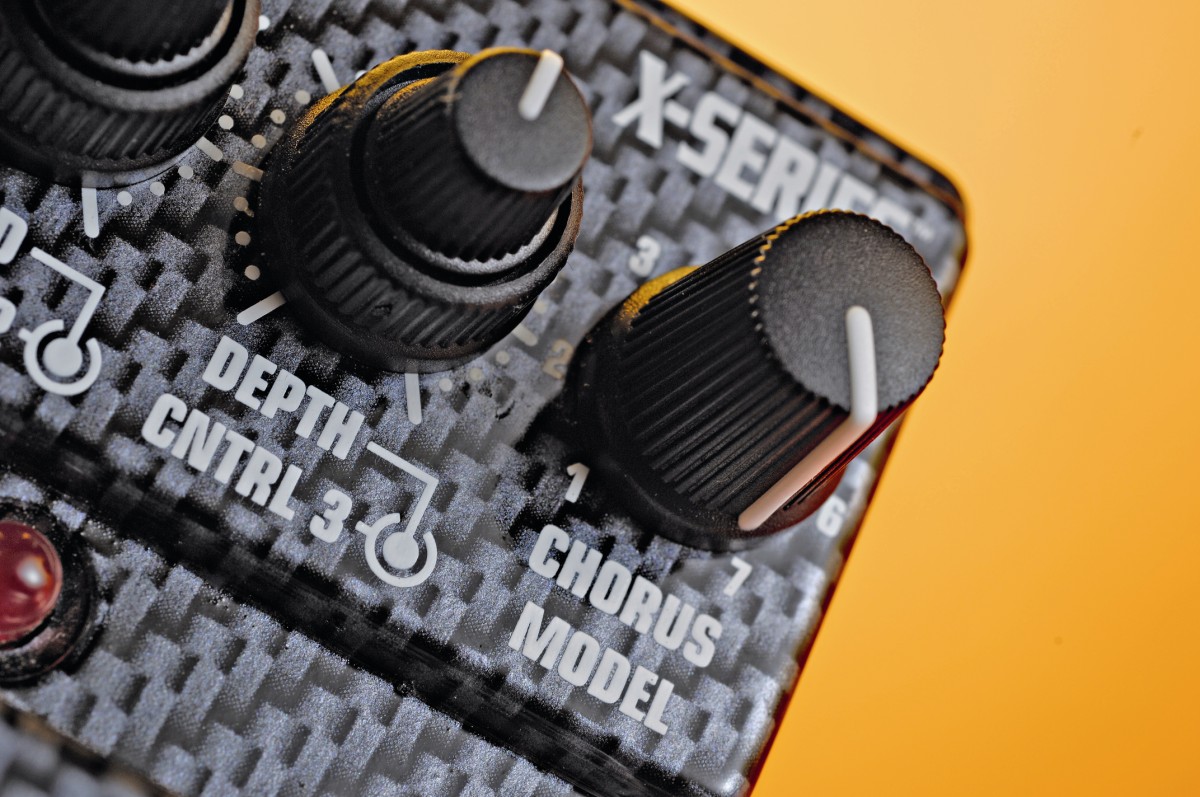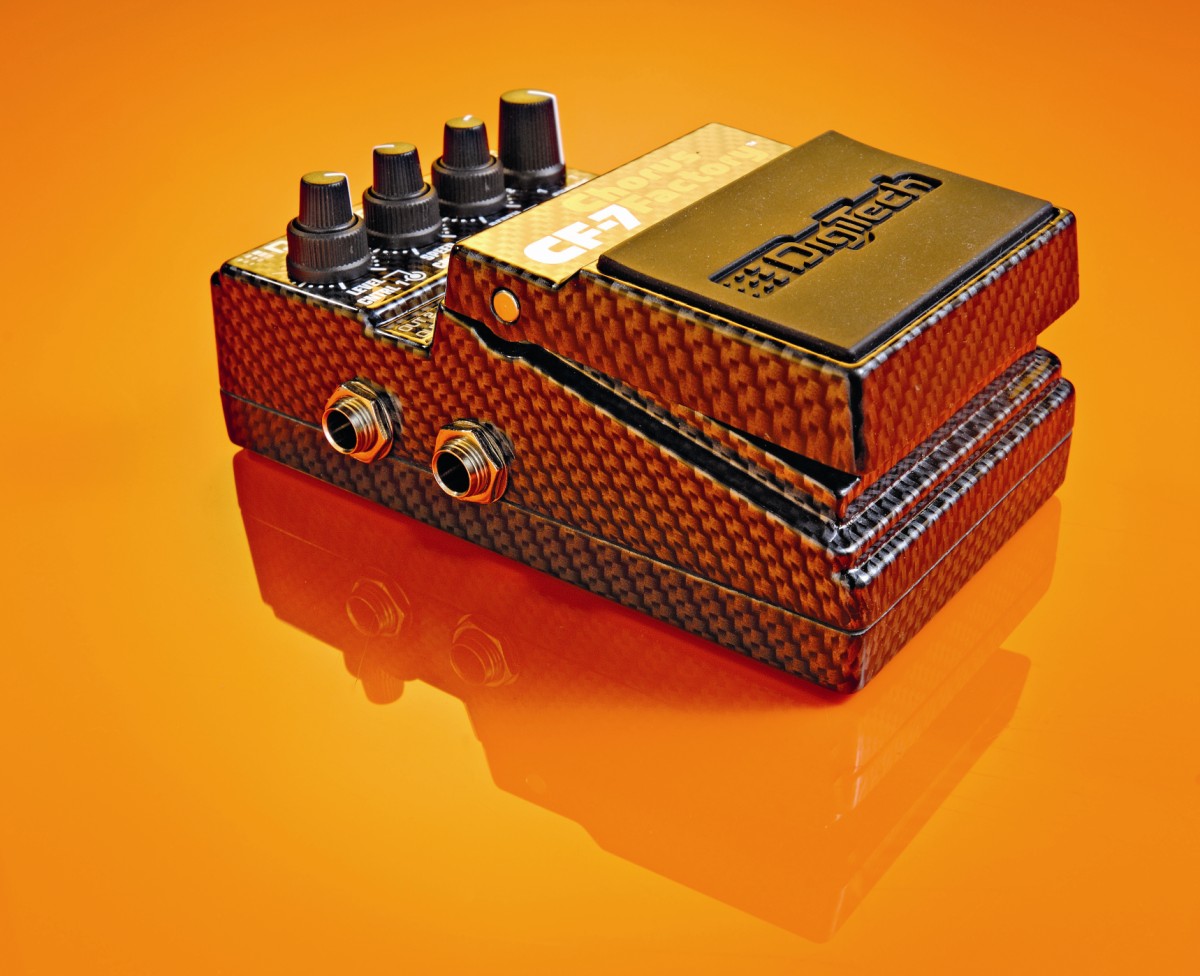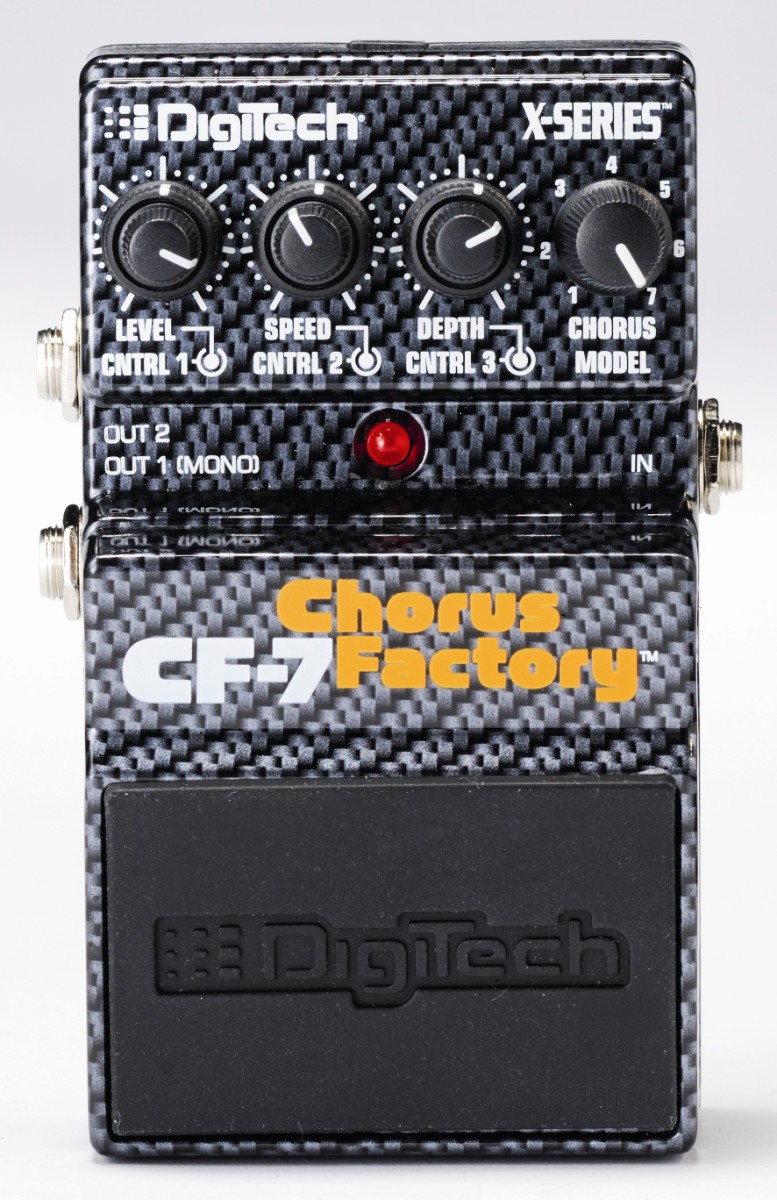MusicRadar Verdict
Due to the difficulty in changing sounds you should think carefully on the practical side if you fancy using CF-7 on stage, but for recording and home-use it's one of the very best modelling choruses out there.
Pros
- +
High quality and range of tones. Cabinet sim makes it ideal for recording.
Cons
- -
Lack of remote switching. Same colour as DF-7. Controls are cramped.
MusicRadar's got your back

Digitech CF-7 Chorus Factory

Digitech CF-7 Chorus Factory

Digitech CF-7 Chorus Factory
The DigiTech CF-7 Chorus Factory is a collection of chorus pedals crammed into a single unit; a stompbox with a vibe and design that will be very familiar to most guitarists.
Until you plug the pedal in and hear the very stark differences, it's very similar in look to the DF-7 Distortion: same front panel, fifth colour orange logo and weight.
Even the faux carbon fibre finish is identical, and although we'd applaud DigiTech's resistance to the idea of producing yet another sky-blue chorus, a slight change in hue might have been a good plan. The thought of mistakenly treading on your DF-7 prior to an emotive ballad intro on a darkened stage is not a pleasant one.
Features
The seven units that have been modelled within the CF-7 range from the soupily organic (Voodoo Lab's lauded Analog Chorus), via the legendary (E-HX's Small Clone) to the pin-sharp (the difficult to find but very desirable TC Electronic SCF). There are also a couple of BOSS models - quite a step considering the crowded market at which the CF-7 is aimed - and the Fulltone Choral flange too.
Each is selected via a seven-way rotary pot and, depending on which model you've selected, the influence of the trio of dual-concentric pots. For example, when using the Voodoo Lab model, the third control pot regulates the effect's width; with the BOSS CE-5 it controls the low filter. This versatility is repeated across the seven choruses and, in the case of the TC Electronic and Fulltone models, you can also dial in a legitimate flanger.
One of the series' more thoughtful innovations is the flexible output mode, something we would gauge to be very useful when using the CF-7. You can enable the lauded CIT cabinet modelling by powering the pedal up while the footswitch is depressed and, from there, obtain a natural tone for recording and such. It's automatically applied to the pedal's two inputs, thus giving a truly stereo operation.
Want all the hottest music and gear news, reviews, deals, features and more, direct to your inbox? Sign up here.
In use
The only practical downside here, and which is repeated across the X-Series in its entirety (with the exception of the Red Special Artist pedal), is the lack of the remote switching of models and, unless you're happy to bend down and reset the tone every time you wish to utilise a number of models, we're confident that most of us would stick to one chorus throughout a single set. This raises the question of why would you actually buy a CF-7 at all.
The answer is down to the very high quality of the choruses on offer, and whether you prefer the classic Nirvana throb of the Small Clone, the lavish tonal polish afforded by the BOSS CE-5, or the myriad steps in between. This pedal has it all covered.
It goes without saying that you will need to alter the EQ for each chorus model depending on the guitar you use, your amplification and the style you employ, but we can report that the controls for each model offer an efficient way of rounding off unnecessarily spiky corners or indeed sharpening proceedings to your liking.
As we've suggested, performing this tone-tailoring whilst on-stage isn't going to be easy simply due to the unavoidably cramped front panel. So we'd suggest that, if your project studio is missing a seriously versatile chorus or three, and one that also provides an industry-standard cabinet simulation, the CF-7 is the only seriously affordable option.
Battery life is restricted to four hours of continuous use too, so many hardened giggers may well feel that they'll stick with their BOSS CH-1 or DigiTech Multi Chorus, and use the CF-7 for recording purposes - we certainly would.
Aside from practicalities, the CF-7 is yet another extremely impressive stompbox from DigiTech and if you have a problem with the modest asking price, try adding up what it would cost to buy all seven units that are modelled within: it's a great deal more than £99.
MusicRadar is the number one website for music-makers of all kinds, be they guitarists, drummers, keyboard players, DJs or producers...
- GEAR: We help musicians find the best gear with top-ranking gear round-ups and high-quality, authoritative reviews by a wide team of highly experienced experts.
- TIPS: We also provide tuition, from bite-sized tips to advanced work-outs and guidance from recognised musicians and stars.
- STARS: We talk to musicians and stars about their creative processes, and the nuts and bolts of their gear and technique. We give fans an insight into the craft of music-making that no other music website can.
